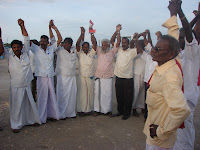
Text of Agreement between Indian and Sri Lankan fishermen representatives who met at St.Thomas Mount, Chennai, India, from 20th to 22nd August 2010.
English Translation (Original in Tamil)
The following proposals are made by the Sri Lankan team after the discussions it had with Indian fishermen (since its arrival in India) from 16th to 22nd August on the issues of fishing on the Indo-Sri Lankan border and after taking into consideration the various proposals made by Tamil Nadu (fishermen).
1. On basis of the firm assurance that Indian fishermen will stop mechanised trawl fishing in Sri Lankan waters within a period of one year, the following proposals have been made.
2. Boundaries have been fixed for (trawl) fishing beyond the Sri Lankan-Indian border in Sri Lankan waters in a manner that the livelihood of Sri Lankan fishermen will not be affected.
This will be as follows;
A. In the Palk Bay, north of the Mannar Island, fishing can be done beyond a distance of 3 nautical miles from the Sri Lankan shore.(Fishing should be done seawards of Palathivu and Iranithivu).
3. Fishing will be done (in the Palk Bay) on the following days in different months,
Month Monday Tuesday Wednesday Thursday Friday Saturday Sunday
January 4 4
February 4 4
March 4 4
April 2 2
May
June 4 4
July 4 4
August 4 4
September
October 4 4
November 3 3
December 2 2
Total number of days allowed for fishing: 70 days
Timings: Afternoon 4 pm to morning 4 am
Days of fishing: Wednesday and Saturday
B. In the Palk Straits of the northern Jaffna coast, fishing can be done up to 5 nautical miles south of the Sri Lanka-India maritime border. (This will be applicable for the area starting from the west of Delft Island till East Wadamarachi border)
C. In the Gulf of Mannar, south of the Mannar Island, fishing can be done till a distance of 5 nautical miles from the Sri Lanka-India border
4. Use of pair trawls is to be completely avoided. Care has to be taken not to affect small scale fishing operations. Number of boats (coming from India) need to be fixed.
5. These proposals will be placed before the two Governments for their consideration. Government decision will be final.
6. All the conditions for fishing (by Indian trawlers) should be monitored with the help of the two Governments.
7. The monitoring group should be composed of representatives from the fisheries officials, fishermen and the Navy/Coast Guard from both countries.
8. For taking action on violations to the conditions imposed (on fishing by Indian trawlers), committees shall be formed on both sides to take suitable corrective action. In the case of disputes in the implementation of this agreement between the two sides, ARIF in India and NAFSO in Sri Lanka will be responsible to mediate and sort out the issues.
9. All difficulties arising in implementing these proposals and new issues will be discussed in the next round of talks between the two sides in Sri Lanka.
10. With regards to fishing by country boats, the use of mono-filament nets needs to be avoided and this will be discussed in the next round of talks.
11. These proposals will apply to all Tamil Nadu mechanised boat fishermen (who operate in the areas mentioned in this agreement).
The above proposals have been accepted by fishermen representatives of both countries and their signature affixed hereunder.